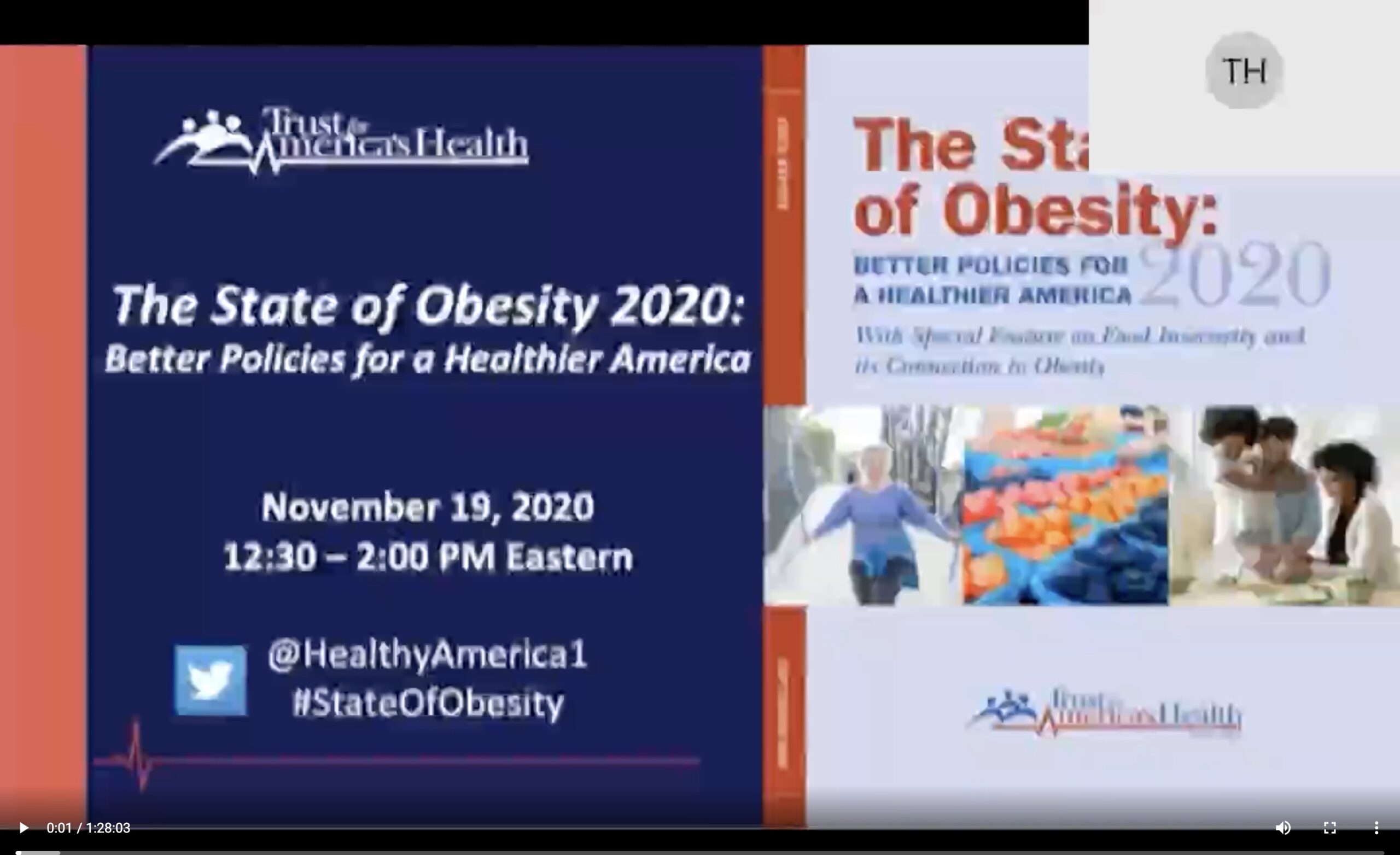
For the first time since data has been tracked, the U.S adult obesity rate passed 40 percent – 42.4 percent of U.S. adults have obesity. In 2019, 12 U.S. states (AL, AR, IN, KS, KY, LA, MI, MS, OK, SC, TN and WV) had adult obesity rates at or above 35 percent, up from zero states above the 35 percent mark as recently as 2012. In 2020, these statistics take on new significance: recent studies have shown that people with obesity who get COVID-19 are more likely to be hospitalized and end up in intensive care than individuals without obesity.
Our panel of experts covered the latest national obesity rates and trends, highlighting promising approaches that states and localities have undertaken to ensure healthy communities. In addition, they offered policy recommendations that can incorporate innovative approaches to help all Americans lead healthier lives.
Resources
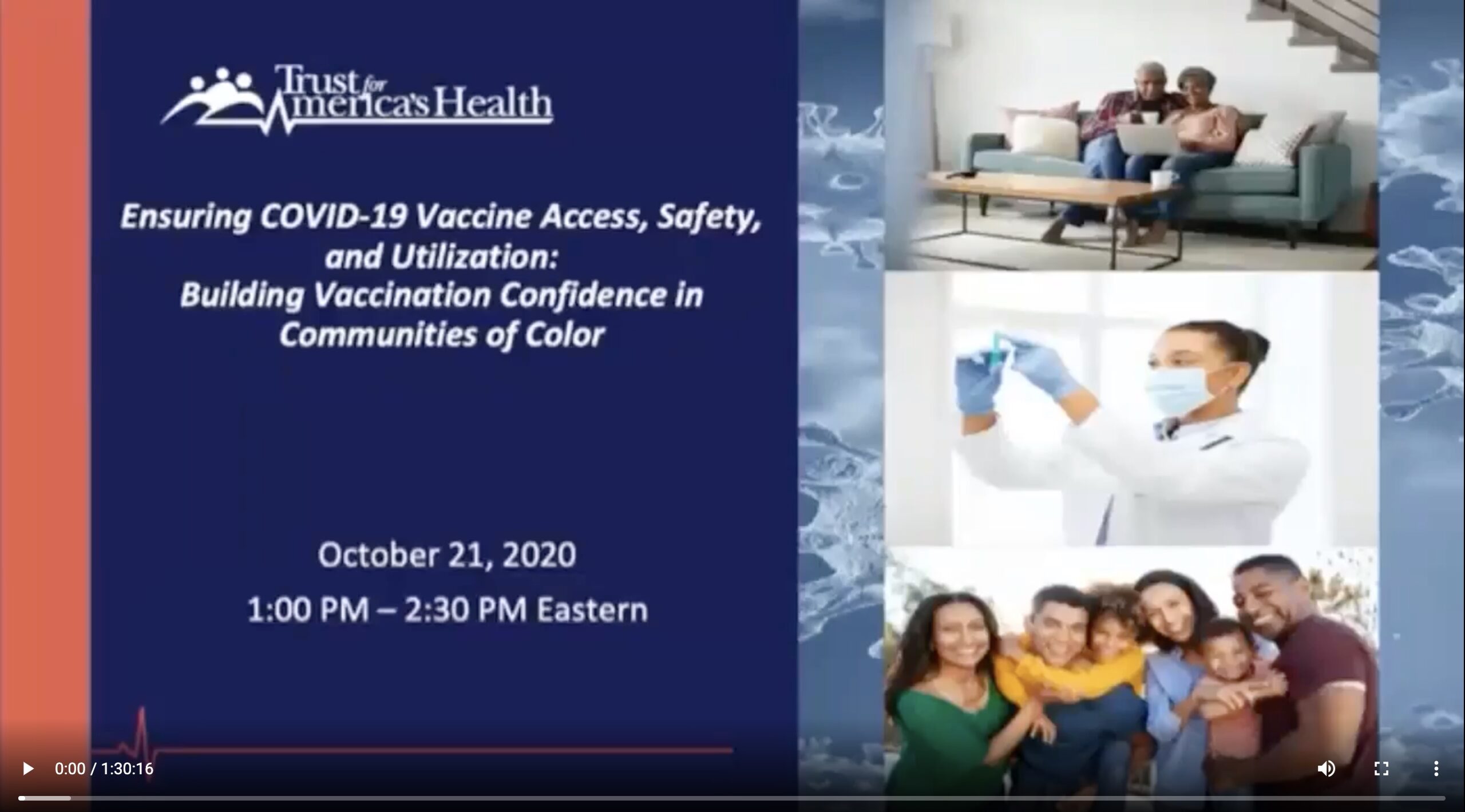
This webinar comes at a critical juncture as COVID-19 vaccine development continues. As has been the case with previous public health emergencies, the COVID-19 pandemic is exposing racial inequities that have long existed in the U.S. Racial and ethnic disparities also continue in vaccine access, due to contributing factors such as lack of access to health coverage and care and issues of distrust.
Featured experts shared with policymakers and stakeholders the historical reasons for vaccine hesitancy in communities of color, highlighted ongoing vaccination disparities and discussed policy recommendations to build vaccine confidence and access in communities of color.
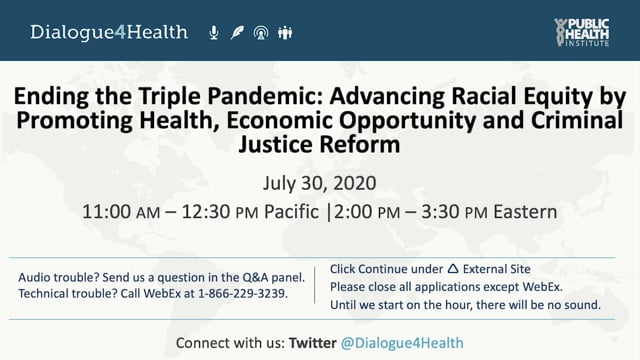
On July 30, Trust for America’s Health, American Public Health Association, NAACP, the National Black Nurses Association, the National Collaborative for Health Equity, and the National Medical Association hosted a virtual Congressional briefing focused on the disproportionate health and economic impacts of the COVID-19 pandemic on the Black community and other communities of color, and how structural racism drives systemic inequities in health, the economy, and criminal justice.
TFAH and our co-sponsors have compiled the following resources:
- Congressional Briefing Recording (July 30, 2020)
- COVID-19 and the Disproportionate Impacts on Communities of Color, TFAH (July 29, 2020)
- Creating the Healthiest Nation: Advancing Health Equity, American Public Health Association (2020)
- National Collaborative for Health Equity Fact Sheet (2020)
- Allegories on race and racism, Dr. Camara Jones, TEDxEmory (July 10, 2014)
-
- We Hold These Truths, AAC&U and TRHT Institute (2020)
- Minimum Wages and Racial Inequality, Derenoncourt and Montialouix (June 26, 2020)
- Examining the Black-White Wealth Gap, Brookings (February 27, 2020)
- Racial and Ethnic Disparities in Access to Use of Paid Family and Medical Leave: Evidence from Four Nationally Represented Datasets, U.S. Bureau of Labor Statistics (January 2019)
- Toward the Science and Practice of Anti-Racism: Launching A National Campaign Against Racism, Dr. Camara Jones, Ethnicity & Disease (2018)
- How Understanding Racism Can Move Public Health to Action, Dr. Camara Jones, The Nation’s Health, APHA (February 2016)
- Kelly Report: Health Disparities in America, Congressional Black Caucus Braintrust (2015)
- Systems of Power, Axes of Inequity Parallels, Intersections, Braiding and Strands, Dr. Camara Jones, Medical Care (October 2014)
- Addressing the Social Determinants of Children’s Health: A Cliff Analogy, Dr. Camara Jones, et al. Journal of Health Care for the Poor and Underserved (2009)
- Levels of Racism: A Theoretical Framework and a Gardener’s Tale, Dr. Camara Jones, American Journal of Public Health (August 2000)
Pending Congressional Legislation:
Trust for America’s Health thanks our Congressional briefing cosponsors:
American Public Health Association
NAACP
National Black Nurses Association
National Collaborative for Health Equity
National Medical Association
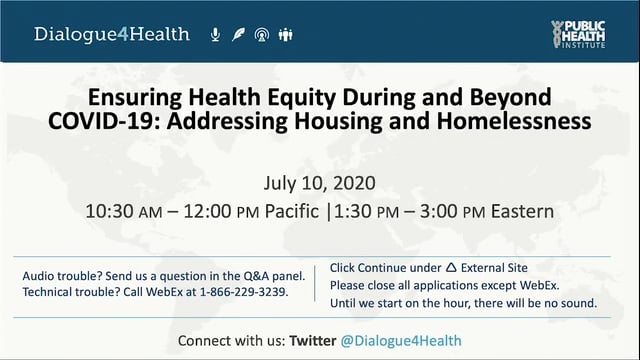
Many Americans struggle to maintain a safe and healthy place to live. People who are housing insecure or experience homelessness typically have poorer physical and mental health outcomes and are at greater risk for infection during the COVID-19 pandemic, in addition to other challenges.
In response, solutions such as providing short-term housing arrangements for newly released low-level criminal justice offenders to rental assistance and freezes on evictions have been put in place to reduce the risk of exposure among vulnerable populations during the pandemic. However, these short-term solutions won’t be enough. Also required are sustainable long-term programs that equitably improve opportunities for individuals to live in safe and affordable housing.
This Webinar highlights the disproportionate and long-existing economic and health disparities among people who are housing insecure or experience homelessness. In addition, the webinar highlights what is currently being done to protect this population during the COVID-19 pandemic, and identify the long-term policy, system, and environmental changes that are needed to advance health equity by effectively addressing housing insecurity and homelessness.
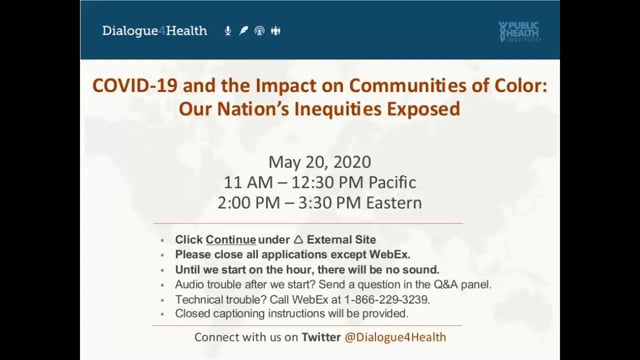
Prior to the COVID-19 pandemic, communities of color already faced inequitable opportunities for health and well-being. Racial and ethnic health disparities have long existed, largely rooted in structural inequities that have persisted across generations. From the lasting effects of residential segregation to poverty, discrimination, less access to good jobs and economic opportunity, higher rates of insured, less access to health care, and much more, people of color have experienced the undue burden of these inequities.
While everyone is at risk for COVID-19, individuals who have underlying medical conditions are at higher risk for severe illness from COVID-19. And people of color disproportionately have higher rates of many chronic conditions, such as diabetes, hypertension, kidney disease, and asthma which are associated with the social determinants of health. Furthermore, people of color are over-represented in low-wage jobs and in many of the front-line jobs designated as essential workers in this pandemic. Now as more cases of and deaths from COVID-19 are identified across the country, this pandemic is revealing the consequences of these longstanding inequities, through the early data reported on the higher rates of cases and deaths among people of color. There is an urgent need to advance equity in the pandemic response and to prevent it from further exacerbating disparities.
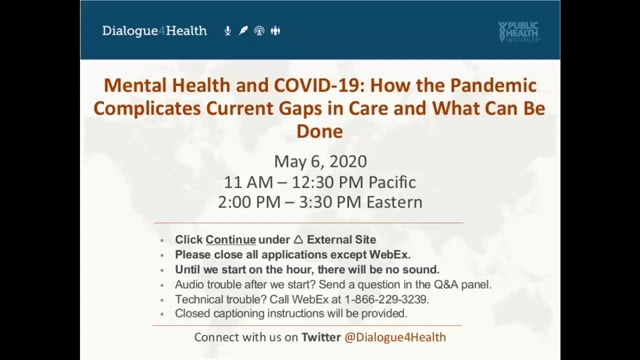
The ongoing COVID-19 pandemic has created new challenges and aggravated existing obstacles to mental health care and well-being. Individuals, families, and communities nationwide are grappling with financial insecurity, increased difficulty accessing mental health and substance use care, and an elevated level of overall stress and anxiety. This pandemic also threatens to widen existing disparities in access, treatment, and recovery for mental illness and substance use disorders. All of this culminates into a possible “second wave” of rising mental anguish, addiction, and social dislocation.
The discussion focused on the unique challenges for mental health in the wake of COVID-19. Attendees learned about current advocacy efforts to improve the mental health system, what specialized resources in response to the pandemic have been released to date, and what else may be needed.
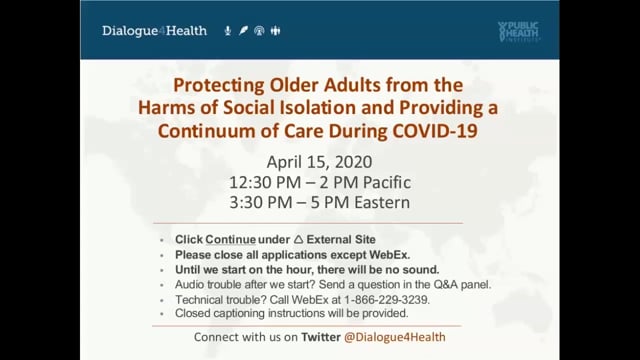
The ongoing COVID-19 crisis presents unique challenges for the public health and aging sectors. While social distancing protects older adults who are at higher risk for complications from the virus, the practice can exacerbate social isolation, a longstanding issue for this population. The needs of older adults must be considered across a continuum of care from primary prevention to post-acute care in the coming months.
Trust For America’s Health Policy Development Manager, Megan Wolfe for a Web Forum to discuss how to address the unique challenges that older adults face while adhering to public health advice to minimize risk of infection. Attendees will learn about the consequences of social isolation, how the aging services sector has adapted its delivery models, and hear about promising practices from the field and the importance of working with public health partners to address the needs of older adults.
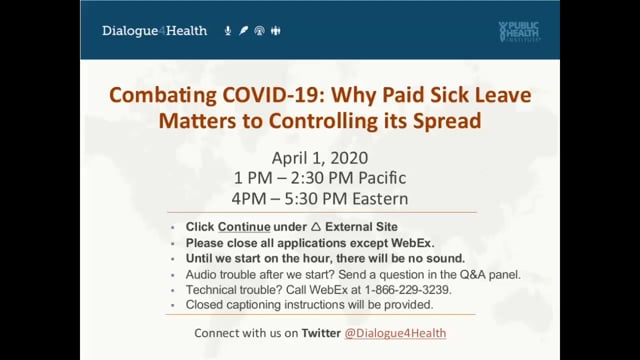
This webinar highlights recommendations made in TFAH’s Ready or Not and Promoting Health and Cost Control in States (PHACCS) reports on the important role of paid sick leave in combating infectious diseases, as well as other complementary evidence-based policies that can be adopted by federal, state and local governments and by employers.
Presenters focused on pending federal legislation, states that have adopted laws regarding paid leave, and businesses that are expanding these benefits. In addition, they discussed the potential short-term uses of the recently approved supplemental budget to assist individuals without paid leave when confined to their homes.
Recommended for anyone working in public health, advocacy, school health, community-based organizations, businesses, labor unions, hospitals, health systems, insurers, policy staff, and local and state health officials.







